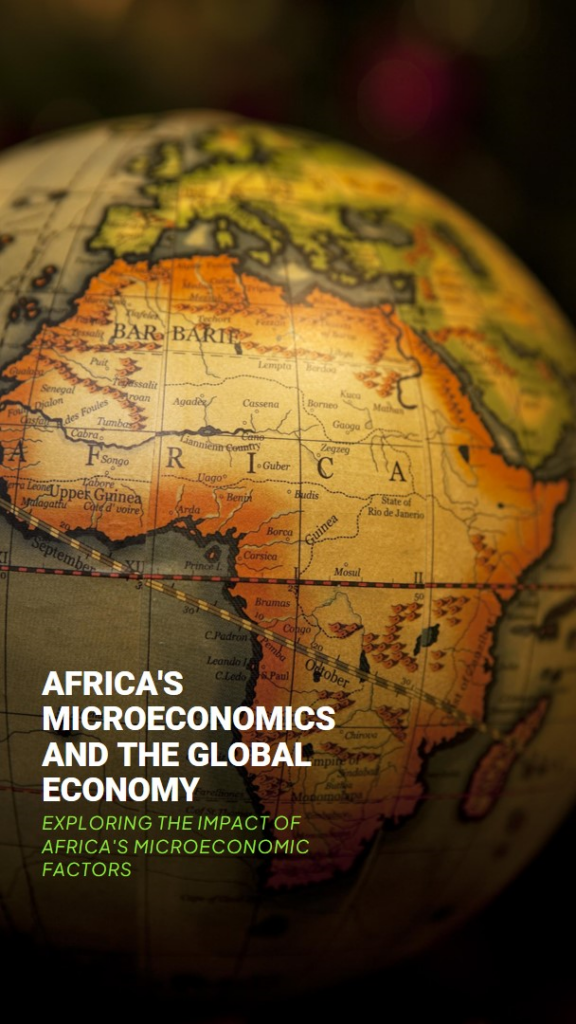Abstract:
This article explores the significant yet often underappreciated impact of Africa’s microeconomic factors on the global economic landscape. In an era of increasing globalization, understanding the continent’s diverse economies, with their unique challenges and opportunities, and their interaction with the world economy is essential. This piece aims to dissect and examine various microeconomic elements within African nations and their collective influence on global trade, investment, and economic trends.

Contents:
- Introduction
- Overview of Microeconomic Factors in Africa
- The Role of Small and Medium Enterprises (SMEs) in Africa
- Africa’s Commodity Markets and Global Trade
- Labor Market Dynamics and Global Impact
- Regional Economic Policies and Their Global Implications
- Challenges and Opportunities for Global Investors
- Conclusion
- FAQs
1. Introduction
While often overlooked in global economic discussions, Africa’s diverse microeconomic landscapes are pivotal in shaping worldwide economic trends. This continent, rich in cultural and economic diversity, offers a unique perspective on how localized economic activities ripple across the globe. This article ventures into the heart of Africa’s microeconomies, unraveling how consumer behaviors, market dynamics, and small-scale enterprises in this vast continent influence and intertwine with the broader global economic fabric.

2. Overview of Microeconomic Factors in Africa
Africa’s microeconomic scene is a mosaic of various elements. Consumer behavior, with a burgeoning middle class, Africa’s consumer market is rapidly evolving. This segment explores the changing consumption patterns, savings, and spending behaviors across different African demographics and how these shifts impact global market trends. Market structures, from informal markets to burgeoning tech hubs, Africa’s market structures are diverse. The intricacies of these market systems, including monopolies, oligopolies, and competitive markets within the continent, play a critical role in determining economic outputs and efficiencies. Resource allocation, this section delves into how resources, both natural and human, are allocated and managed across different African economies. The effective or ineffective allocation of these resources not only shapes local economies but also affects global supply chains and investment patterns.
3. The Role of Small and Medium Enterprises (SMEs) in Africa
SMEs in Africa are more than just business entities; they are the lifelines of many economies across the continent. Economic contributions, this part examines how African SMEs contribute to employment, offer innovative solutions to local problems, and drive economic growth. Global connections, the article explores how SMEs in Africa are increasingly connecting with the global economy, whether through digital platforms, international partnerships, or export-oriented strategies. Challenges and growth, despite facing numerous challenges such as access to finance and market limitations, African SMEs have shown remarkable resilience and adaptability. Their growth trajectories provide insights into the evolving business landscape in Africa and its impact on the global economic scene.
4. Africa’s Commodity Markets and Global Trade
The continent’s rich endowment of natural resources significantly influences the global commodity markets. This section delves into the impact on global prices, how Africa’s export of key commodities like oil, precious metals, and agricultural products shapes global pricing trends. Supply chain dynamics, the role of African nations in global supply chains, particularly in critical minerals like cobalt and platinum, essential for electronics and automotive industries. Sustainability and ethical sourcing, discussions around sustainable and ethical sourcing practices in African commodity markets, and their global implications in terms of trade policies and corporate responsibility.
5. Labor Market Dynamics and Global Impact
Africa’s labor market, characterized by its youthful demographic and burgeoning workforce, is a pivotal factor in the continent’s microeconomic framework. Youthful workforce, the potential of Africa’s young population in driving innovation and economic growth, and its impact on global labor trends. Skills development and education, how investment in education and skill development can transform Africa’s labor market, contributing to both local and global economies. Diaspora and knowledge transfer, the role of the African diaspora in global labor markets, and how their remittances and knowledge transfer back to their home countries influence local economies.
6. Regional Economic Policies and Their Global Implications
Digital economy advancements, the increasing focus on developing the digital economy in many African countries, such as advancements in mobile banking and fintech, can have significant implications for global digital trade and e-commerce trends. Infrastructure development, how regional investments in infrastructure like transportation and telecommunications not only bolster local economies but also attract global businesses looking for new markets and efficient logistics.
7. Challenges and Opportunities for Global Investors
Investing in Africa presents a complex tapestry of challenges and opportunities. This section examines market diversity and complexity, the challenges posed by the diversity and complexity of markets across the continent, requiring investors to have nuanced, region-specific strategies. Emerging markets potential, the immense potential for growth in emerging African markets, offering investors opportunities in sectors like technology, renewable energy, and consumer goods. Political and economic stability, the importance of understanding the political and economic landscape of individual African countries for risk assessment and long-term investment planning. Innovative financing models, exploring innovative financing models such as impact investing and venture capital that are increasingly popular in African markets.
8. Conclusion
The microeconomic factors of Africa play a crucial and dynamic role in shaping the global economy. From the bustling markets of Lagos to the tech hubs of Nairobi, the continent’s economic activities are increasingly intertwined with global economic trends. Understanding these factors offers insights into not only Africa’s potential but also the opportunities and challenges it presents in the global economic landscape.
9. FAQs
- Q1: How do consumer trends in Africa affect global markets?
- Q2: What role do African SMEs play in the global economy?
- Q3: How does Africa’s commodity trade influence global pricing?
- Q4: What are the key considerations for investors interested in African markets?
- Q5: How do labor market trends in Africa impact the global workforce?

Leave a Reply